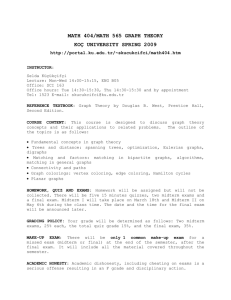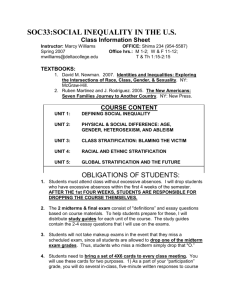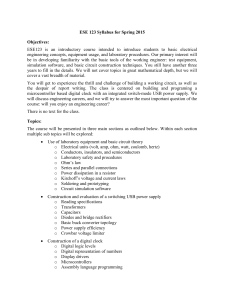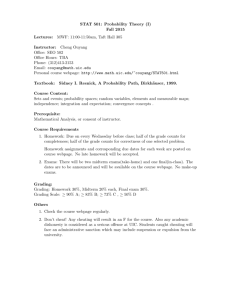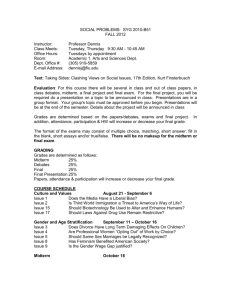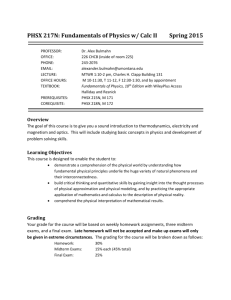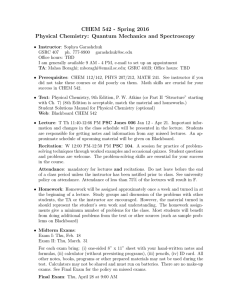Syllabus - Department of Physics and Astronomy
advertisement
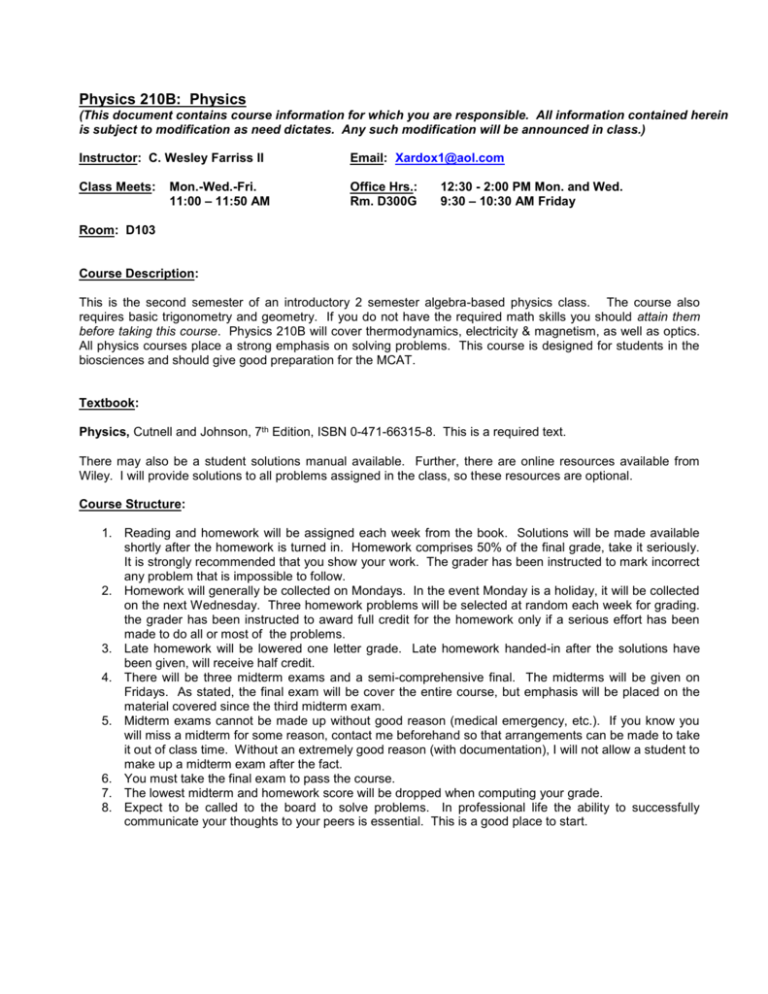
Physics 210B: Physics (This document contains course information for which you are responsible. All information contained herein is subject to modification as need dictates. Any such modification will be announced in class.) Instructor: C. Wesley Farriss II Email: Xardox1@aol.com Class Meets: Office Hrs.: Rm. D300G Mon.-Wed.-Fri. 11:00 – 11:50 AM 12:30 - 2:00 PM Mon. and Wed. 9:30 – 10:30 AM Friday Room: D103 Course Description: This is the second semester of an introductory 2 semester algebra-based physics class. The course also requires basic trigonometry and geometry. If you do not have the required math skills you should attain them before taking this course. Physics 210B will cover thermodynamics, electricity & magnetism, as well as optics. All physics courses place a strong emphasis on solving problems. This course is designed for students in the biosciences and should give good preparation for the MCAT. Textbook: Physics, Cutnell and Johnson, 7th Edition, ISBN 0-471-66315-8. This is a required text. There may also be a student solutions manual available. Further, there are online resources available from Wiley. I will provide solutions to all problems assigned in the class, so these resources are optional. Course Structure: 1. Reading and homework will be assigned each week from the book. Solutions will be made available shortly after the homework is turned in. Homework comprises 50% of the final grade, take it seriously. It is strongly recommended that you show your work. The grader has been instructed to mark incorrect any problem that is impossible to follow. 2. Homework will generally be collected on Mondays. In the event Monday is a holiday, it will be collected on the next Wednesday. Three homework problems will be selected at random each week for grading. the grader has been instructed to award full credit for the homework only if a serious effort has been made to do all or most of the problems. 3. Late homework will be lowered one letter grade. Late homework handed-in after the solutions have been given, will receive half credit. 4. There will be three midterm exams and a semi-comprehensive final. The midterms will be given on Fridays. As stated, the final exam will be cover the entire course, but emphasis will be placed on the material covered since the third midterm exam. 5. Midterm exams cannot be made up without good reason (medical emergency, etc.). If you know you will miss a midterm for some reason, contact me beforehand so that arrangements can be made to take it out of class time. Without an extremely good reason (with documentation), I will not allow a student to make up a midterm exam after the fact. 6. You must take the final exam to pass the course. 7. The lowest midterm and homework score will be dropped when computing your grade. 8. Expect to be called to the board to solve problems. In professional life the ability to successfully communicate your thoughts to your peers is essential. This is a good place to start. Some General Ideas to Keep in Mind 1. Physics is a mathematical science. You have to work problems to learn it. Problem solving will be emphasized. Bluntly put, if you do not work all the assigned problems and understand them, you won’t do well in this course. If you are having trouble understanding how to work the problems, seek help and work more problems until you understand them. There are no useful shortcuts. 2. I recommend all students read through problems that have not been assigned and ask yourself if you can solve them. These are the types of problems you are likely to see on exams, so this is a good strategy for preparing for exams. 3. Units matter in physics! Most answers involve some quantity or property with units associated. Units must also be reported in an answer. Leaving off the unit will result in docking some portion of the credit for that problem. This can add up. Don’t forget units. 4. Show your work. Partial credit on homework or exams is only possible if you have demonstrated how far you went before “losing your wheels.” No partial credit can be given if the work is not included. 5. Work all problems algebraically before plugging in numbers. This improves your chances of understanding the physics and for self-correcting your work. Further, when computing the numerical answer, bring your units forward and do the same operations on them. It is a good way to check your reasoning. For example, if you expect an answer in newtons and you get meters/second instead, something’s wrong. 6. Put a box around your final answer including units. If an answer isn’t boxed, we won’t even look for it. 7. Don’t get behind! Physics continuously builds upon itself. Everything taught in the first semester and previously in this course can be called upon for the subject at hand. In keeping with that, all physics homework and exams are “cumulative” to some extent, 8. You may begin to notice that there are actually quite few concepts underlying all the different subjects you have covered in your physics courses. Physics is the most basic of all sciences. Beginning to understand this reveals the natural order underlying all things. You may never look at the world the same way again. Some Ground Rules: Discussion and questioning are encouraged. If it pertains to the material under study, there is no such thing as a “dumb question” in my class. I expect a safe, courteous learning environment. Turn off all cell phones, PDA’s, iPods and the like. If you fail to do this, you will be told to leave. One person talks at a time. If you must enter the class late, enter as quietly as possible and take a seat. Grading Policy: Grades for each assignment and exam follow an absolute scale, not a curve. The grades range from 5 being the highest possible (A-level work) to zero for incomplete work. Examine the grading scale directly below: Exams (percent) 87-100 75-86 60-74 50-59 <50 incomplete Non-exams (points) 9-10 7-8 5-6 3-4 1-2 0 letter grade A B C D F lower than “F” Please note that incompletes are lower than an “F.” Students put themselves at a huge disadvantage by not turning in assignments. This is important! The final course grades will be a weighted average from all class activities. The weighting scheme is as follows: Participation/Effort (my determination) Homework Exams Final Exam 5% 50% 25% 20% This grading scheme illustrates in general the way your grade will be calculated. Keep track of your graded work so that you can use it to check your current grade at any time. Setting up a spreadsheet is an excellent way to do this. I reserve the right to raise a student’s grade slightly above the calculated number based upon classroom participation or notable extra effort by the student. Tentative Schedule for the Course: This course schedule is subject to change. Should changes occur, students will be notified in advance during class. Week 1, (wk. of Jan 28): Chapter 11: Introduction and Fluids Homework Problems: 4, 13, 23, 29, 31, 41, 51, 57, 58, 70, (due Feb. 5) Week 2, (wk. of Feb. 4): Chapter 12: Temperature and Heat Homework Problems: 4, 6, 9, 20, 39, 40, 41, 51, 58, 70 Week 3, (wk. of Feb 11): Chapter 13: The Transfer of Heat Homework Problems: 1, 3, 5, 10, 11, 16, 17, 19, 20, 23 Week 4, (wk. of Feb. 18): Chapter 14: The Ideal Gas Law and Kinetic Theory Homework Problems: 1, 2, 5, 6, 9, 13, 26, 30, 31, 41 Week 5, (wk. of Feb. 25): Chapter 15: Thermodynamics Homework Problems: 1, 3, 8, 22, 33, 35, 40, 46, 68, 71 Exam I – through Chapter 14 Week 6, (wk. of March 4): Chapter 16: Waves and Sound Homework Problems: 1, 2, 7, 15, 18, 25, 29, 50, 59, 71 Week 7, (wk. of March 11): Chapter 17: Constructive and Destructive Interference of Sound Waves Homework Problems: 1, 3, 6, 8, 13, 16, 19, 25, 30, 36 Week 8, (wk. of March 18): Chapter 18: Electric Forces and Fields Homework Problems: 1, 2, 7, 18, 27, 29, 33, 46, 47, 49 Exam II – Through Chapter 17 Week 9, (wk. of March 25): Chapter 19: Electric Potential Energy and the Electric Potential Homework Problems: 1, 2, 11, 13, 16, 18, 27, 28, 36, 41 Week 10, (wk. of April 1): Chapter 20: Electric Circuits Homework Problems: 1, 7, 10, 11, 21, 25, 31, 49, 61, 81 Week of April 8th: Spring Break! Week 11, (wk. of April 15): Chapter 21: Magnetic Forces and Magnetic Fields Homework Problems: 1, 3, 11, 27, 39, 46, 47, 49, 57, 61 Week 12, (wk. of April 22): Chapter 22 & 23: Electromagnetic Induction & Alternating Current Circuits Homework Problems: 1, 11, 29, 35, 57 (Ch. 22) & 1, 3, 9, 15, 27 (Ch. 23) Exam III – Through Chapter 21 Week 13, (wk. of April 29): Chapter 24: Electromagnetic Waves Homework Problems: 1, 3, 7, 8, 11, 19, 21, 25, 31, 35 Week 14, (wk. of May 6): Chapter 25: The Reflection of Light: Mirrors Homework Problems: 4, 5, 8, 13, 17, 22, 27 Week 15, (wk. of May 13): Chapter 26: The Refraction of Light: Lenses and Optical Instruments Suggested Problems: 4, 9, 23, 34, 39, 47, 60, 69, 77, 89 Final Exam: TBA


